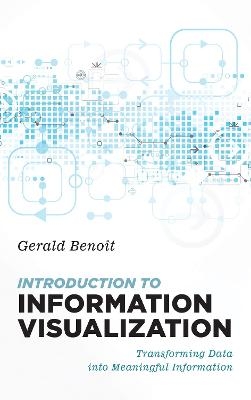
Introduction to Information Visualization
Rowman & Littlefield (Verlag)
978-1-5381-1834-4 (ISBN)
Introduction to Information Visualization: Transforming Data into Meaningful Information is for anyone interested in the art and science of communicating data to others. It shows readers how to transform data into something meaningful - information.
Applying information visualization in research, service, teaching, and professional life requires a solid understanding of graphic design and the aesthetic along with hands-on skills and knowledge of data principles and software. This book is applicable to students in all domains, to researchers who need to understand how to create graphics that explain their data, and to professionals and administrators for professional development training. Website Designers and Human-Computer Interaction researchers will appreciate the backstory of designing interactive visualizations for the web.
Drawing on the author’s years of practice and teaching, it bridges the two worlds in ways everyone can participate in the future of information and to appreciate the beautiful in information:
oStep-by-step directions in the fundamentals of HTML5, CSS, and d3.js
oDesign challenges with fully explained answers
oWeb-site support for code samples (JavaScript, d3.js, python), live examples, and a place to build a community of other IV pros
oUseful for teaching design to scientists; data to the humanities
oGuidance for using the text depending on the class makeup
oReview of third-party visualization software, big data trends, and script libraries
oGuidance on how to continue in the IV world after graduation
This full-color book features graphics and a companion Web site.
The online companion site hosts living examples, updates, and errata. You’re invited to participate on the site, too, sharing your questions, solutions, and ideas. For most readings, there is a partner design lab. At the conclusion of the course, there is a complete interactive information visualization service documentation for libraries.
Gerald Benoît, Ph.D., teaches across a range of interrelated topics - information science, computer science, programming, web design, systems analysis, visual communication, and information visualization. He teaches data science courses for UC Berkeley’s Data Science program. Before joining UC Berkeley, Prof. Benoît was a faculty member at Simmons College for fifteen years, teaching in the information science and computer science programs. There he taught at undergraduate, graduate, and doctoral levels. Prof. Benoît’s background includes training in graphic arts and production, at one time art director and partner in the advertising firm Imada, Wong, Park, + Benoît (continues as IW Group), and as an information scientist writing on human-computer interaction, information visualization and aesthetics, communications theory, and language models in search engine design. Prof. Benoît has been an invited lecturer at Harvard University, the University of Rhode Island, Simmons College, and elsewhere to lecture on the opportunities of visualization in business, as a service, and professional education.
Preface
Acknowledgements
1.Introduction: why information visualization? Why skills + data + communication?
2.The Ethics/Aesthetics of Information
3.The Art of Information
4.The Tech of InfoVis
5.The Data of Visualization
6.Thinking through visualizations
7.Real World visualizations and text visuals
Appendix 1
Appendix 2
On the companion website, find …
8.Deploying an InfoVis service [the Harvard Libraries project documentation]
9.Appendices:
Machine Learning and Visualization - a quick view of visualizations in Big Data
| Erscheinungsdatum | 15.03.2019 |
|---|---|
| Verlagsort | Lanham, MD |
| Sprache | englisch |
| Maße | 154 x 234 mm |
| Gewicht | 490 g |
| Themenwelt | Mathematik / Informatik ► Informatik ► Datenbanken |
| Informatik ► Software Entwicklung ► User Interfaces (HCI) | |
| Sozialwissenschaften ► Kommunikation / Medien ► Buchhandel / Bibliothekswesen | |
| ISBN-10 | 1-5381-1834-3 / 1538118343 |
| ISBN-13 | 978-1-5381-1834-4 / 9781538118344 |
| Zustand | Neuware |
| Haben Sie eine Frage zum Produkt? |
aus dem Bereich


